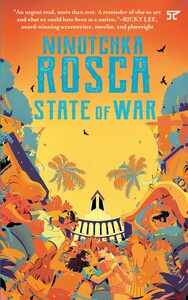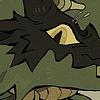Take a photo of a barcode or cover
The first part (Book of Acts) of this sort-of historical novel bored me. It was about three young people, leading different lives, attending a festival amid an ongoing dictatorship. Yet the second part (Book of Numbers) blew me away. Rosca displayed her deft narrative skills, pulling off something like a 100 Years of Solitude type of awesomeness. The final part is not satisfying, but still the book is great. Sorry for my post-reading incoherence.
This book opens during a festival in the Phillippines with three young people - Eliza, Anna, and Adrian. Adrian is rich and the son of a prominent family. Anna is a widow who was recently detained and tortured by the military. And Eliza is the daughter of a courtesan. As the festival is going on - so is a war. Anna gets in contact with the rebels who are planning to bomb the festival and Adrian is captured.
The book jumps to the past of these three families to trace the history of Adrian's family money, and that Eliza is a relative of Anna's. weaving together their stories, the final part of the book brings us back to the present and lead up to what happens with the war and the rebels.
This is an okay book. Quite confusing. I think the middle part - the history - was my favorite. It took me awhile to get into this one and it actually required a lot of attention to keep me reading. It had some redeeming qualities. Like I said - the history in the middle of this book is the longest section and the most interesting in my opinion.
The book jumps to the past of these three families to trace the history of Adrian's family money, and that Eliza is a relative of Anna's. weaving together their stories, the final part of the book brings us back to the present and lead up to what happens with the war and the rebels.
This is an okay book. Quite confusing. I think the middle part - the history - was my favorite. It took me awhile to get into this one and it actually required a lot of attention to keep me reading. It had some redeeming qualities. Like I said - the history in the middle of this book is the longest section and the most interesting in my opinion.
It is true, Rosca's writing style though heavy is beautiful, rich and full of imagery, longing and memory. It was eye opening for me to learn about civilian torture under the reign of Marcos and learning more about guerilla warfare. The novel has two stories: one that spans the Spanish, American, and Japanese occupied periods, the other more present history during the Marcos regime. I enjoyed both but have to admit breaking up the stories as she did made a rather halting experience, and I would have enjoyed the book more had she kept the first part more continuous. By the time we returned to the first story line I didn't care anymore and just wanted the book to end.
It was a heavy book. The story pulls you in. At times it gets a bit slow and her writing style can weigh the reader down. But in general I am glad I read it. What I did like was enjoyable and informative. 3.5 stars.
It was a heavy book. The story pulls you in. At times it gets a bit slow and her writing style can weigh the reader down. But in general I am glad I read it. What I did like was enjoyable and informative. 3.5 stars.
challenging
dark
emotional
informative
reflective
sad
tense
slow-paced
Plot or Character Driven:
Character
Strong character development:
Complicated
Loveable characters:
Complicated
Diverse cast of characters:
Yes
Flaws of characters a main focus:
Yes
Wow. The Book of Numbers is a real treasure. I'm most certain that this novel would be praised a hundredfold more if such part was let to stand alone on its own. This is definitely one of the best literary texts in English by a Filipina author.
Ninotchka Rosca's quality of prose is just so great I don't even have enough words to describe it in a few lines. She offers like that of an edifice intricately architected inside and out, or of an ornate fabric delicately woven by a great seamstress — it emits an enchanting aura the more you delve into her words and their placements.
She's also a one woman army dropping a ton load of truth bombs about World War II and the Marcos conjugal dictatorship. The novel is also a great fictional rundown of the Philippine history, offering the inter-generational dialogue which clarifies the details on the vague period during the transition between the colonial Spanish Philippines and the American Philippines up to the recent times.
Surely, this novel is a task for the impatient or a discontent for the expectant, but this shall still go down as one of the greatest.
Ninotchka Rosca's quality of prose is just so great I don't even have enough words to describe it in a few lines. She offers like that of an edifice intricately architected inside and out, or of an ornate fabric delicately woven by a great seamstress — it emits an enchanting aura the more you delve into her words and their placements.
She's also a one woman army dropping a ton load of truth bombs about World War II and the Marcos conjugal dictatorship. The novel is also a great fictional rundown of the Philippine history, offering the inter-generational dialogue which clarifies the details on the vague period during the transition between the colonial Spanish Philippines and the American Philippines up to the recent times.
Surely, this novel is a task for the impatient or a discontent for the expectant, but this shall still go down as one of the greatest.
2nd time putting this down. generally i'm okay with slow or difficult reads but there's just something about the writing style that kills my brain each time i try to pick it up. right book wrong time? idk i'll wade through it when i feel guilty enough about putting it down.
challenging
dark
emotional
informative
reflective
sad
medium-paced
Plot or Character Driven:
A mix
Strong character development:
Yes
Loveable characters:
Complicated
Diverse cast of characters:
Yes
Flaws of characters a main focus:
Yes
4 Let me start off by saying the minus points is because it confused me more that I thought it would, but overall I really liked this book. The book, for me, is hopeful for my generation, a generation born without war. After four hundred years of war in the Philippines, how does it affect how we experience living? Do we even "live" in a state of war? The ending really solidified the idea to me and I don't think I would have liked it if it didn't end this way. The book places emphasis in remembering our history, a lot of the answers we wanted lay in the past. The thought of forgetting the past is not the way to the beginning. I think she solidifies this by narrating the past as the plot happens in the present.
Something Rosca constantly repeats is how we are a country of beginnings, but no endings. I think that sentiment still rings true today. We like to find new horizons, we love the grass is greener on the other side sentiments, but how do we end? How do we close a chapter in our history? We don't, it continues to find new beginnings but we still hope for salvation. The endeavour towards the hope of a new beginning is not painted in a foolish life, but in such a reflective way. Time passes.
While I was hesitant to compare it to the House of the Spirits, as a lot of people tend to when they talk about magical realism, I think this book is good to read if you really loved the House of the Spirits.
EDIT: just found out that the author has been saying some transphobic shit, and I don’t feel comfortable recommending her books.
Something Rosca constantly repeats is how we are a country of beginnings, but no endings. I think that sentiment still rings true today. We like to find new horizons, we love the grass is greener on the other side sentiments, but how do we end? How do we close a chapter in our history? We don't, it continues to find new beginnings but we still hope for salvation. The endeavour towards the hope of a new beginning is not painted in a foolish life, but in such a reflective way. Time passes.
While I was hesitant to compare it to the House of the Spirits, as a lot of people tend to when they talk about magical realism, I think this book is good to read if you really loved the House of the Spirits.
EDIT: just found out that the author has been saying some transphobic shit, and I don’t feel comfortable recommending her books.
adventurous
challenging
funny
mysterious
reflective
fast-paced
Plot or Character Driven:
A mix
Strong character development:
Complicated
Loveable characters:
Yes
Diverse cast of characters:
Yes
Flaws of characters a main focus:
Yes
Graphic: Death, Torture, Violence, War
This book has been parked on my shelf since my friend loaned me her copy a couple of years ago. At the time, I wasn't able to see the book through - it's the kind that requires careful attention, otherwise you'll miss certain details in the foreshadowing that will make sense in the third and final part, The Book of Revelations.
Philippine historical fiction is my top favorite genre and I'm honestly annoyed at myself for not having read this novel sooner when it's so gripping and illuminating. Of course the author added her own twists and turns to the events that did take place during the Spanish rule, WWII, the Japanese occupation, and Marcos dictatorship but I still find that the best way to remember our past is through stories such as this.
State of War revisits our colonial past and unveils the hodge-podge that is the Filipino identity. Through the stories of Anna's ancestors, as told in the The Book of Numbers, interwoven with those of Adrian and Eliza's, we trace the many cultural and sociopolitical changes that our country has undergone at the hands of our foreign oppressors - shaping it into the Philippines we know today.
What struck me most was Luis Carlos' journey in the resistance and how it's always been peasants who have liberated our country despite - or perhaps, because of - their marginalized state. It's absurd how the ruling elite will yap about independence and freedom when they have always been complicit in the suffering of our people (exhibit A: Laurel's puppet government). In the end, the same guerrilla movement that shed blood to gain our freedom was betrayed by the white man, proving once again that we are in a constant state of war - the facies of our enemies just change. To this day, we remain victim to U.S. imperialism.
Speaking about the present, Ninotchka Rosca's prose is as timely as ever. This is the same plea 0f my generation:
This is a must-read for all Filipinos.
(My ex said it's required reading in Ateneo and I hope more universities and schools add this in their syllabus.)
Philippine historical fiction is my top favorite genre and I'm honestly annoyed at myself for not having read this novel sooner when it's so gripping and illuminating. Of course the author added her own twists and turns to the events that did take place during the Spanish rule, WWII, the Japanese occupation, and Marcos dictatorship but I still find that the best way to remember our past is through stories such as this.
State of War revisits our colonial past and unveils the hodge-podge that is the Filipino identity. Through the stories of Anna's ancestors, as told in the The Book of Numbers, interwoven with those of Adrian and Eliza's, we trace the many cultural and sociopolitical changes that our country has undergone at the hands of our foreign oppressors - shaping it into the Philippines we know today.
What struck me most was Luis Carlos' journey in the resistance and how it's always been peasants who have liberated our country despite - or perhaps, because of - their marginalized state. It's absurd how the ruling elite will yap about independence and freedom when they have always been complicit in the suffering of our people (exhibit A: Laurel's puppet government). In the end, the same guerrilla movement that shed blood to gain our freedom was betrayed by the white man, proving once again that we are in a constant state of war - the facies of our enemies just change. To this day, we remain victim to U.S. imperialism.
Speaking about the present, Ninotchka Rosca's prose is as timely as ever. This is the same plea 0f my generation:
...God, if there's one, don't let all of us die (the house! the house!), allow one to survive and wear down the eternity of the dictator; if he lives to a hundred, let us last a hundred and ten, long enough to spit on his grave and drown his corpse in the lagoon of our contempt; if he lives to two hundred, let us survive two hundred and ten, just long enough to fertilize the gardens with the shit of his memory; and if he's thinking of living through his sons' sons, allow us to outlive them all, just for the pleasure of being alive when he dies, before we bury them in the amnesia of our relief at his passing.
This is a must-read for all Filipinos.
(My ex said it's required reading in Ateneo and I hope more universities and schools add this in their syllabus.)







